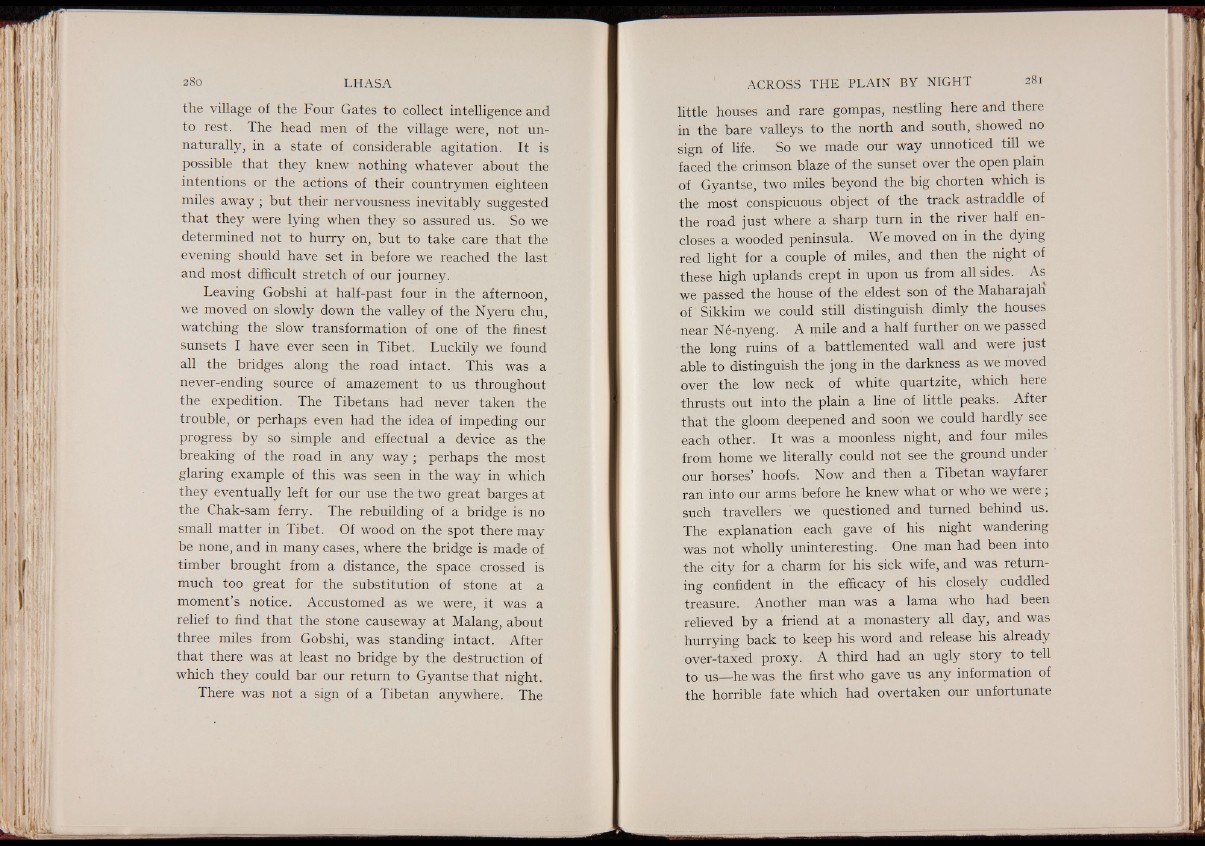
the village of the Four Gates to collect intelligence and
to rest. The head men of the village were, not unnaturally,
in a state of considerable agitation. It is
possible that they knew nothing whatever about the
intentions or the actions of their countrymen eighteen
miles away • but their nervousness inevitably suggested
that they were lying when they so assured us. So we
determined not to hurry on, but to take carp that the
evening should have set in before we reached the last
and most difficult stretch of our journey.
Leaving Gobshi at half-past four in the afternoon,
we moved on slowly down the valley of the Nyeru chu,
watching the slow transformation of one of the finest
sunsets I have ever seen in Tibet. Luckily we found
all the bridges along the road intact. This was a
never-ending source of amazement to us throughout
the expedition. The Tibetans had never taken the
trouble, or perhaps even had the idea of impeding our
progress by so simple and effectual a device as the
breaking of the road in any w a y ; perhaps the most
glaring example of this was seen in the way in which
they eventually left for our use the two great barges at
the Chak-sam ferry. The rebuilding of a bridge is no
small matter in Tibet. Of wood on the spot there may
be none, and in many cases, where the bridge is made of
timber brought from a distance, the space crossed is
much too great for the substitution of stone at a
moment’s notice. Accustomed as we were, it was a
relief to find that the stone causeway at Malang, about
three miles from Gobshi, was standing intact. After
that there was at least no bridge by the destruction of
which they could bar our return to Gyantse that night.
There was not a sign of a Tibetan anywhere. The
little houses and rare gompas, nestling here and there
in the bare valleys to the north and south, showed no
sign of life. So we made our way unnoticed till we
faced the crimson blaze of the sunset over the open plain
of Gyantse, two miles beyond the big chorten which is
the most conspicuous object of the track astraddle of
the road just where a sharp turn in the river half encloses
a wooded peninsula. We moved on in the dying
red light for a couple of miles, and then the night of
these high uplands crept in upon us from all sides. As
we passed the house of the eldest son of the Maharaj ah
of Sikkim we could still distinguish dimly the houses
near Ne-nyeng. A mile and a half further on we passed
the long ruins of a battlemented wall and were just
able to distinguish the jong in the darkness as we moved
over the low neck of white quartzite, which here
thrusts out into the plain a line of little peaks. After
that the gloom deepened and soon we could hardly see
each other. It was a moonless night, and four miles
from home we literally could not see the ground under
our horses’ hoofs-. Now and then a Tibetan wayfarer
ran into our arms before he knew what or who we were ;
such travellers we questioned and turned behind us.
The explanation each gave of his night wandering
was not wholly uninteresting. One man had been into
the city for a charm for his sick wife, and was returning
confident in the efficacy of his closely cuddled
treasure. Another man was a lama who had been
relieved by a friend at a monastery all day, and was
hurrying back to keep his word and release his already
over-taxed proxy. A third had an ugly story to tell
to us— he was the first who gave us any information of
the horrible fate which had overtaken our unfortunate